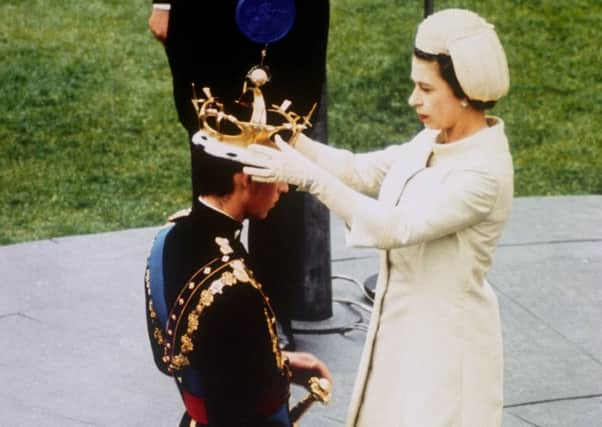How Royals saved themselves from unpopularity, 50 years ago


The heir to the throne was only 20 but already the Duke of Cornwall, Duke of Rothesay, Lord of the Isles and Great Steward of Scotland, when, on a Tuesday in July, half a century ago, he kneeled beneath the Black Tower at Caernarvon Castle, and accepted the insignia of his principality.
It was an occasion as rich in political significance as in pageantry – a defiant statement by an embattled Royal Family that no matter how much Britain was changing, tradition would endure.
Advertisement
Hide AdAdvertisement
Hide Ad“I, Charles, Prince of Wales, do become your liege man of life and limb and of earthly worship and faith and truth I will bear unto you to live and die against all manner of folks,” said the Queen’s eldest son, on bended knee, before she raised him to his feet and kissed him on both cheeks.
It was the biggest royal event since the Coronation, but it played to an audience very different from that of 16 years earlier.
The Beatles and Beyond the Fringe had demolished the age of deference and ushered in a new era of revolution. And in the Welsh towns and villages Charles was to inherit, many were taking the concept literally.
“The investiture had major political significance that is not always remembered now,” said Prof Brendan Evans, an author and respected political expert at Huddersfield University.
Advertisement
Hide AdAdvertisement
Hide Ad“Welsh nationalism was on the upsurge. At a by-election in 1966, Plaid Cymru won against all expectations – and on top of that there was terrorism from the Free Wales Army, who burned down TV transmitters and holiday homes owned by English people.
“There was a feeling that the country should be moving towards nationhood and independence – and yet this ceremony was a statement by the British establishment that the United Kingdom was going to remain united.
“Some people felt it was being done in a provocative way. In fact it wasn’t, but the timing made it appear somewhat provocative.”
An interview given by the famously outspoken Prince Philip had also not helped the Windsors’ cause.
Advertisement
Hide AdAdvertisement
Hide Ad“He said the Royal Family was down on its uppers, they weren’t being funded properly or fairly – and that caused quite an outrage,” Prof Evans said.
“One poll showed that half the nation had gone republican. Clearly, that was a gross exaggeration, but the Royal Family did go through a phase of unpopularity with some people, and as part of its retaliation they agreed to do something which hadn’t happened before – to present themselves in a very informal light way.”
Their vehicle was Royal Family, a documentary nearly two hours long, jointly produced by ITV and the BBC and screened a week before the investiture.
Prof Evans said: “1969 was the peak year, except possibly the annus horribilis of 1992 when Charles and Diana separated, in which the Royal Family courted real unpopularity.
Advertisement
Hide AdAdvertisement
Hide Ad“The 1960s was for some people a very radical time. There was a big change in youth culture and some of that was about questioning traditional, old-fashioned stuffiness.
“There was no sign of the Royal Family being a victim of that, but there was a sense that it was becoming rather remote.
“But opinion has always turned around, and today it’s looking more entrenched than ever.
“Not only is the Queen massively popular, but also the younger generation – Charles’s children.”
Tomorrow: Year the world danced to a different beat.